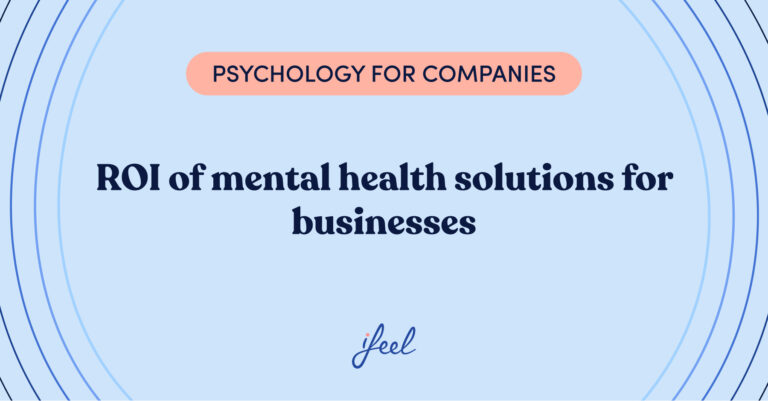Health and social care professionals are constantly exposed to challenges that test their physical, emotional, and mental resilience. This work environment, characterised by continuous attention to human suffering and critical decision-making under pressure, generates conditions that can significantly impact their psychosocial well-being.
That is why, in recent years, talking about psychosocial risks in healthcare workers has become a recurring theme due to their capacity to trigger mental health problems such as chronic stress, anxiety, burnout and depression in these professionals. The problem is that these risks not only affect the health and well-being of professionals, but can also negatively influence the quality of care they provide to patients, increasing the likelihood of clinical errors and decreasing the effectiveness of the health service in general.
Strategies that include both organisational interventions and individual self-care practices are essential to mitigate these risks and promote a healthier work environment. This article explores in depth the psychosocial risks in healthcare workers, their impact on workers’ mental health, and best practices to address them, including practical exercises based on real-life examples to facilitate coping with these challenges.
Download our Psychosocial Risk Factors template to prevent mental health problems at work. This template will help you identify and efficiently address these risks, promoting the well-being of your employees and your company’s productivity. Download the template now and improve your work environment!
Understanding psychosocial risks in healthcare workers
The term ‘psychosocial risks’ refers to those aspects of work design, organisation, and management, as well as its social and environmental context, that have the potential to cause psychological or physical harm.
In healthcare settings, these psychosocial risks may include: high workload, irregular working hours, direct exposure to traumatic situations, and a lack of organisational support.
Psychosocial risks in healthcare workers
1. Workload and rhythm of work: Health professionals often work in high-pressure environments with little time for rest, which can lead to fatigue and burnout.
2. Direct exposure to traumatic situations: Health professionals often face medical emergencies and patient suffering, which can lead to considerable emotional toll and contribute to post-traumatic stress if adequate support is not in place.
3. Role and organisation: Lack of role clarity and poor organisational structure can increase uncertainty and stress.
3. Interpersonal relationships: If not properly managed, interactions with colleagues and patients can be a source of stress.
Impact of psychosocial risks on healthcare workers
The impact of these risks on healthcare professionals is considerable. Prolonged exposure to a stressful work environment can lead to the development of mental health disorders such as anxiety, depression, and burnout syndrome.
In fact, according to data from a recent study, it is estimated that more than 50% of healthcare workers have experienced signs of burnout at some point in their career.
Strategies to mitigate psychosocial risks
Implementing effective strategies to mitigate these psychosocial risks in healthcare workers is essential to protect their mental health. To do so, some of the key recommendations below can be implemented:
| Intervention | Description | Example of implementation |
| Risk assessment | Conduct regular assessments to identify and address psychosocial risks in the workplace | Leverage our Psychosocial Risk Factors template to prevent mental health problems at work. |
| Training | Training in communication skills, conflict resolution, stress management skills, and resilience. | Interpersonal skills workshops |
| Mental well-being solutions | Implement well-being solutions that include access to mental health services and health promotion activities. | Mental well-being solutions for companies such as ifeel’s. |
| Organisational support | Creation of support and supervision networks | Peer discussion groups |
| Flexibility | Implement well-being solutions, including access to mental health services and health promotion activities. | Implementation of flexitime |
Activity: Practising self-care
Implementing the ‘stress diary’ technique can be useful for health professionals. This technique involves keeping a daily record of stressful situations, including identifying triggers, emotions experienced, and strategies used to manage them.
These practices not only help to assess psychological risk and identify patterns of stress but also promote the development of effective coping mechanisms. To complement this technique, here are some questions that can invite reflection and self-care:
- What specific situations triggered stress in my day today?
- Reflecting on these helps to identify recurring patterns and situations that need attention.
- How did I react emotionally to these situations?
- Becoming aware of the emotions that arise can facilitate better emotional management.
- What strategies did I use to manage stress and how did they work?
- Evaluating the effectiveness of the strategies employed offers opportunities to improve future responses.
- What physical signs did I notice in my body in response to stress?
- Identifying physical symptoms of stress can be crucial to implementing more effective self-care practices.
- What can I do differently tomorrow to reduce or manage my stress level more effectively?
- This question encourages proactive thinking and concrete action planning to improve well-being.
- What additional support might I need to manage stress more effectively?
- The need for external resources, such as peer support or mental health services, can be central to self-care.
These questions encourage self-assessment and encourage professionals to take a more mindful and proactive approach to their mental and emotional well-being.
Integrating well-being into organisational policies
Integrating the above strategies within the different work environments is essential to effectively addressing psychosocial risks in healthcare workers.
In this regard, senior management must be committed to creating a working environment that values mental well-being as much as productivity. This includes promoting a culture of openness where employees feel safe to express their mental health concerns.
“If we want to demand rigour and results, we must also demonstrate that we are available to offer support when needed.’
–Vasco Armés, HR Director at PERI Iberia, an ifeel partner company.

Trust the leaders
At ifeel, we know that addressing psychosocial risks in healthcare workers is essential not only for their well-being, but also for the quality of care they provide. Taking a proactive and evidence-based approach to managing these risks will help improve the mental health of professionals and ensure a safer and healthier working environment.
To facilitate this process, we encourage you to download our Psychosocial Risk Factors template to prevent mental health problems at work. You will be able to identify and efficiently address the relationship between psychosocial risks and mental health at work, promoting your employees’ well-being and your company’s productivity. Download the template now and improve your work environment!
To support companies in this process, our team of expert workplace well-being psychologists has created a mental well-being solution for businesses that improves talent retention, reduces presenteeism, and combats employee stress.
With our mental well-being solution, your company’s HR managers can receive personalised, data-driven advice on improving mental health at work. In addition, this solution offers employees a 360° mental well-being service structured at different levels according to their needs. Try our solution now to see how it could help you.
We hope you found this article on psychosocial risks in healthcare workers interesting. If you would like more information about our mental well-being solution for companies, simply request it, and we will contact your team as soon as possible.











